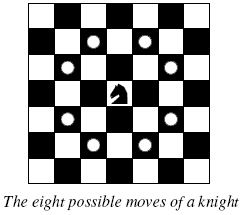Description
 Background
Background The knight is getting bored of seeing the same black and white squares again and again and has decided to make a journey
around the world. Whenever a knight moves, it is two squares in one direction and one square perpendicular to this. The world of a knight is the chessboard he is living on. Our knight lives on a chessboard that has a smaller area than a regular 8 * 8 board, but it is still rectangular. Can you help this adventurous knight to make travel plans?
Problem
Find a path such that the knight visits every square once. The knight can start and end on any square of the board.
Input
The input begins with a positive integer n in the first line. The following lines contain n test cases. Each test case consists of a single line with two positive integers p and q, such that 1 <= p * q <= 26. This represents a p * q chessboard, where p describes how many different square numbers 1, . . . , p exist, q describes how many different square letters exist. These are the first q letters of the Latin alphabet: A, . . .
Output
The output for every scenario begins with a line containing "Scenario #i:", where i is the number of the scenario starting at 1. Then print a single line containing the lexicographically first path that visits all squares of the chessboard with knight moves followed by an empty line. The path should be given on a single line by concatenating the names of the visited squares. Each square name consists of a capital letter followed by a number.
If no such path exist, you should output impossible on a single line.
If no such path exist, you should output impossible on a single line.
Sample Input
3 1 1 2 3 4 3
Sample Output
Scenario #1: A1 Scenario #2: impossible Scenario #3: A1B3C1A2B4C2A3B1C3A4B2C4
题意:给出一个国际棋盘的大小,判断马能否不重复的走过所有格,并记录下其中按字典序排列的第一种路径。

1 #include <iostream> 2 #include <cstdio> 3 #include <cstring> 4 #include <cstdlib> 5 #include <algorithm> 6 using namespace std; 7 const int maxn=26; 8 int n,p,q; 9 int dir[8][2]= {-2,-1,-2,1,-1,-2,-1,2,1,-2,1,2,2,-1,2,1};//记录8个方向 10 bool flag,vis[maxn][maxn];//用于标记 11 int path[maxn][2]; 12 void dfs(int i,int j,int k) 13 { 14 path[k][0]=i,path[k][1]=j; 15 if(k==p*q-1)//走完了 16 { 17 flag=true; 18 return ; 19 } 20 for(int u=0; u<8; u++) 21 { 22 int a=i+dir[u][0]; 23 int b=j+dir[u][1]; 24 if(!vis[a][b]&&a>=0&&b>=0&&a<q&&b<p) 25 { 26 vis[a][b]=true;//标记已走 27 dfs(a,b,k+1); 28 if(flag) 29 return ; 30 vis[a][b]=false;//清楚标记 31 } 32 } 33 } 34 int main() 35 { 36 int k=0; 37 cin>>n; 38 while(n--) 39 { 40 41 cin>>p>>q; 42 printf("Scenario #%d: ",++k); 43 memset(vis,false,sizeof(vis)); 44 memset(path,0,sizeof(path)); 45 for(int i=0; i<q; i++) 46 { 47 for(int j=0; j<p; j++) 48 { 49 flag=false; 50 vis[i][j]=true; 51 dfs(i,j,0); 52 if(flag) 53 break; 54 vis[i][j]=false; 55 } 56 if(flag) 57 break; 58 } 59 if(!flag) 60 printf("impossible"); 61 else 62 { 63 for(int i=0; i<p*q; i++) 64 printf("%c%d",path[i][0]+'A',path[i][1]+1); 65 } 66 printf(" "); 67 } 68 return 0; 69 }
